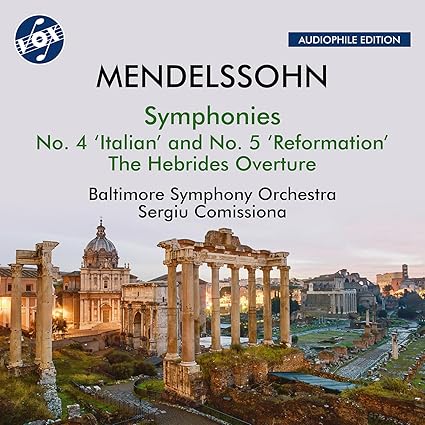

Felix Mendelssohn (1809-1847): The Hebrides in D Major 'Fingal's Cave', Op. 26 Felix Mendelssohn (1809-1847): Symphony No. 4 in A Major 'Italian', Op. 90 Felix Mendelssohn (1809-1847): Symphony No. 5 in D Major 'Reformation', Op. 107
There is no shortage of fine and varied performances of these classics of the early Romantic period. Performances exist on original instruments, or with full traditional orchestra, or traditional but chamber-sized orchestras. I love the first two pieces and have listened to several competing performances of all three for this review. These Vox productions are very good, but the question remains, why choose this over the alternative versions, often with very modern recordings, and with varying styles to fit the listeners preferences?
Well, firstly the recordings are excellent. They are part of the legacy of the recording partnership of Marc Aubort and Joanna Nickrenz of Elite Recordings who produced a wonderful set of recordings for Vox Classics in the 1960's and 1970's whose recording qualities have become justly famous and need no apologies even now in the 21st century. It is a clean, balanced sound without extremes of any sort, and are a fit for these clean, balanced readings by Comissiona, a Romanian conductor who did a wonderful job of orchestral training with the Baltimore Symphony. They make a very nice sound on this release, and the sound overall is a good fit for these lithe readings.
The Italian Symphony, nowadays known as Symphony No. 4, although it's really the third of his symphonies to be composed, is a wonderfully sunny work. It is hard to leave a good performance without feeling in a positive mood, and it reminds me a lot of Symphony No. 1 (composed when he was 15 years old!) and reflects the astonishing fecundity of much of his early compositional development. He is a composer often underrated, maybe he suffers a little from the halo effect of the Victorian esteem he was held in, while he does not display the stuffiness associated with British music of the same period. His compositional style is not innovative, he draws more inspiration from the past than breaking ground for the future, but still produces some works of the highest compositional inventiveness and with a lot of singable tunes. He died young, aged 38, so we do not know how the rest of his compositional life might have developed.
The Hebrides Overture is of course a real early Romantic classic of natural tone painting, it is justly famous and is another example of his natural facility for melody and impression. Like the Italian, it is played straight, no excesses, well recorded again, and provides a reliable guide to this piece.
I find the Reformation Symphony a less entrancing composition than the Italian or Scottish Symphonies, the composer himself was not satisfied with it, it was published only posthumously, and it is not widely performed. It benefits here from similar qualities with clear recording, and reliable and keenly phrased performances.
It is instructive to compare these performances with those with the smaller forces used in the Chamber Orchestra of Europe directed by Yannick Nézet-Séguin. The smaller forces allow slightly faster tempos, a nimbler approach, the modern recording is slightly closer and brass more forward and therefore more evident. These are live recordings, and exciting for that. Orpheus Chamber Orchestra were also excellent with the smaller forces.
Other performances I listened to include the Hanover Band, much too reverberant an acoustic for me, but the smaller forces, and original instruments provide a more edgy listen. Edward Gardner's with the City of Birmingham Symphony Orchestra has some fast speeds (the Saltarello final movement of the Italian for example), and I found his performance and cycle of the symphonies an attractive option.
Overall, I welcome the Vox reissue, the performances and recordings are excellent examples of the more traditional approach. If you prefer a chamber approach, or original instruments version then there are other excellent options available, but I for one will happily return to this reissue with no qualms whatsoever. It is part of an excellent series of Vox 'Audiophile' reissues that with few exceptions provide a high standard of recording quality and some excellent performances, they are worth investigating.
Ian Orbell - October 2024 Symphony No. 4 - Saltarello